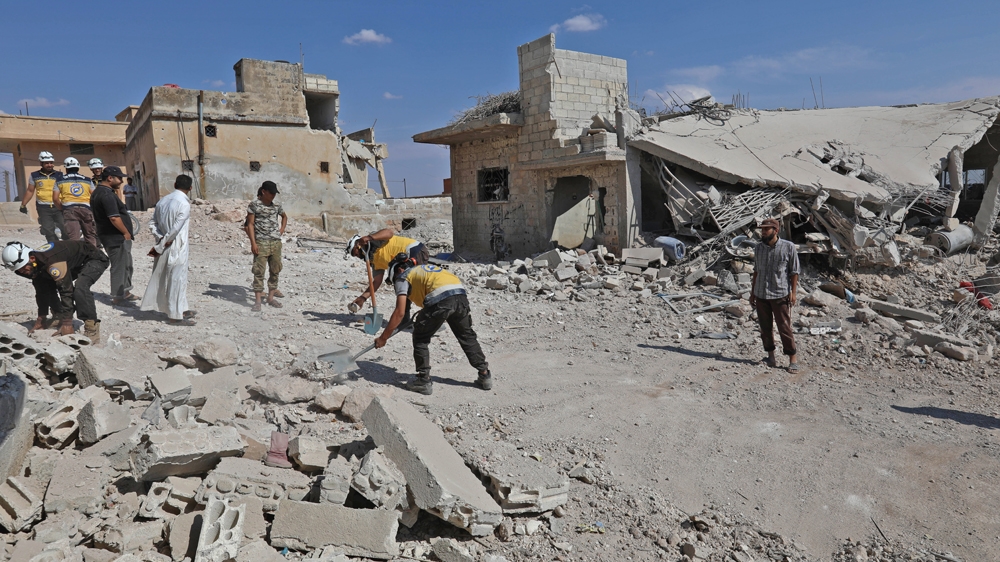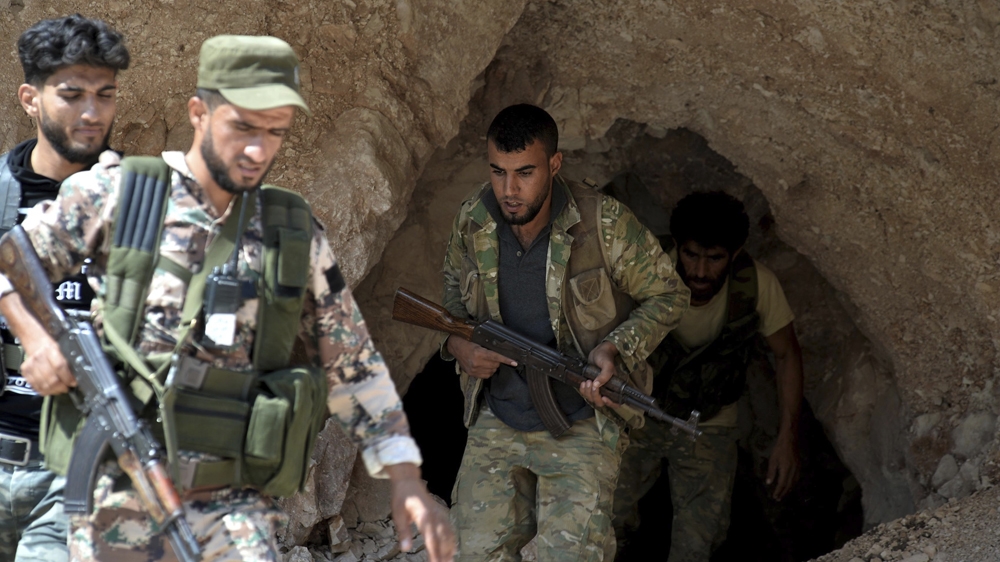Rebels, Turkey prepared for battle, but assault could be delayed
Antakya, Turkey – In the days that followed last week’s summit in Tehran between Russia, Iran and Turkey on the fate of Syria’s Idlib province, the last rebel bastion in the war-ravaged country, the bombardment of opposition-held areas intensified significantly.
The escalation fuelled speculation of an imminent, full-fledged onslaught by Syrian government forces, backed by their Russian and Iranian allies, against the rebels in Idlib.
But although both sides have stepped up their military preparations, there could still be some time before the start of a major ground and air offensive, according to a current rebel commander and a former one.
“I don’t think there will be a [large-scale] attack on Idlib, in any [point],” said Tariq Sulaq, commander of the Second Coastal Division, part of al-Jabha al-Wataniya lil-Tahrir (NLF), one of the two main armed opposition alliances in Idlib.
“I think we are in a period of [searching for] a solution for Syria,” he told Al Jazeera.
Idlib is the last barrier standing between the government of President Bashar al-Assad and its military victory against a rebellion that began in 2011.
The United Nations and aid groups have repeatedly warned of a major humanitarian disaster if the offensive takes place in the northwestern province, where an estimated three million people reside, half of whom are internally displaced.
According to Sulaq, the ongoing targeting of sparsely populated rebel-held areas in southern Idlib and northern Hama provinces does not signal the beginning of a ground offensive.
“The military and media pressure [by the Russians and the Syrian government] aims to win the civilians over and damage the morale of the armed factions by trying to convince them that the Turks can’t protect them,” he said.
For Sulaq, the trilateral summit in the Iranian capital, during which Russia rejected a Turkish call for a ceasefire, did not have a big impact on the situation on the ground. He said he attended a meeting with Turkish military officers one hour after the end of the September 7 talks in Tehran.
“They told us that … if Russia and Iran take the decision to attack the liberated areas and make even one step, they will intervene and will be at the front line with the Syrian fighters,” he said. “They are serious about this decision and their movements on the ground show that.”
Over the past week, Turkey, which backs certain rebel groups in Idlib, has been sending reinforcements to its 12 observation points inside opposition-held areas, which were set up under a “de-escalation” agreement it reached with Russia and Iran last year.
Sulaq said heavy weapons, including tanks, military carriers and batteries, have already entered Idlib, adding that there is a contingency plan for the deployment of Turkish soldiers on the ground in the event of an offensive on Idlib.
 |
| Air raids and shelling targeting rebel-held areas in Idlib have intensified [Omar Haj Kadour/AFP] |
Khalid Rahal, a former commander of opposition armed group al-Hijra ila-Allah (Hijra to Allah), who currently resides in Turkey, agreed that an offensive might not start any time soon, with political negotiations still ongoing.
“The Russians and the regime are preparing; there are convoys, they are amassing troops [near the front line], but I think a political solution is still in process,” he told Al Jazeera.
“Turkey got 20 percent guarantees during the [Tehran] summit – that it will control Idlib. The Russians demanded no targeting of Hmeimim airbase and areas loyal to the regime.”
Russia’s military has accused rebels in Idlib of attacking its Hmeimim base in Syria’s Latakia province with weaponised drones.
According to Rahal, Turkey also got an extension on a deadline set by Russia to resolve the issue of Hay’et Tahrir al-Sham’s (HTS) presence in Idlib. Moscow considers HTS, the other main armed coalition in Idlib, a terrorist organisation and has used it as a justification for the planned offensive on the province.
HTS appeared in 2012 as Nusra Front, the Syrian branch of al-Qaeda, but renounced its affiliation in 2016. Turkey has been trying to dissolve the armed group, and on August 31 it also designated it a terrorist organisation.
Rahal said Turkey’s communication with HTS is continuing, even after Ankara failure’s to come to an agreement with it to disband, while HTS units keep providing security to Turkish convoys entering Idlib.
Yet, if a solution is not reached, Turkey could resort to a military intervention to dissolve HTS by force, added Rahal.
But Ilter Turan, a professor of political science at Istanbul Bilgi University, cast doubt on such a prospect.
“I don’t think Turkey will militarily [eliminate] any group in Idlib, as they [have] all fought in line with its policies up until now,” he told Al Jazeera. “Ankara [hasn’t] signaled a change of heart in this issue.”
Turan also said the latest deployment of Turkish forces “did not please” the Syrian government and its Russian and Iranian allies.
“It is a step that can cause more problems in the trilateral cooperation [between Turkey, Russia and Iran].”
The Turkish foreign ministry did not respond to request for comment on Turkey’s military plans and efforts in Idlib.
 |
| Free Syrian Army fighters exit a cave in the outskirts of Jisr al-Shoghur in Idlib province [Ugur Can/DHA via AP) |
Although a ground offensive on Idlib might have been delayed for now, the armed opposition in Idlib is still making extensive preparations for it, both Rahal and Sulaq confirmed.
Fortifications, tunnel digging and defensive works have been carried out from the Turkmen Mountain in northern Latakia province in the west all the way to the town of Khan Sheikhoun in southern Idlib province.
Sulaq said that uniting the armed groups of the moderate opposition under the umbrella of the al-Jabha al-Wataniya lil-Tahrir three months ago was part of the preparations for the battle for Idlib.
Over the past few months, all groups in the coalition have been holding intensive training and boot camps.
Turkey’s diplomatic effort
Taha Ozhan, a former Turkish MP and head of parliament’s foreign affairs committee, told Al Jazeera that he also does not expect a large-scale operation in Idlib for now.
“There are a couple of political processes that need to be done. There is a meeting in Istanbul in the coming days, some other diplomatic efforts. Without [their conclusion], I don’t expect a full-fledged [offensive] to start,” he told Al Jazeera, referring to the recently announced summit between Russia, Turkey, Germany and France scheduled for later in September.
Turkish President Recep Tayyip Erdogan announced the meeting in late July, saying that it will address “what we can do in the region”.
According to Ozhan, given the participation of France and Germany, it is likely that the summit will focus on the issue of refugees and averting a crisis in densely populated Idlib.
Turkey is already hosting more than three million Syrian refugees.
Hundreds of thousands of people have been killed since Syria’s war broke out more than seven years ago, while millions of others have been forced from their homes.
Apart from fearing a humanitarian disaster and a wave of refugees trying to cross into its territory, Turkey also sees Idlib as a big security risk, Ozhan said.
A potential takeover by the Syrian government could give more operational space to Kurdish forces affiliated with the Kurdistan Workers Party (PKK), which Turkey considers a terrorist organisation, but more worryingly, it could set off a period of insecurity and the resurgence of Islamic State of Iraq and the Levant (ISIL, also known as ISIS), Ozhan pointed out.
“If [the Syrian government] destroys Idlib, nobody knows where it will go. [The situation] could go back to 2013-2015.”
Ozhan said that in parallel with the political negotiations, Ankara is also trying to resolve the issue of HTS’ presence in Idlib. Dissolving the group, he argued, is the only way forward for Ankara.
Mariya Petkova () reported from Antakya, Turkey. Umut Uras () reported from Doha, Qatar




